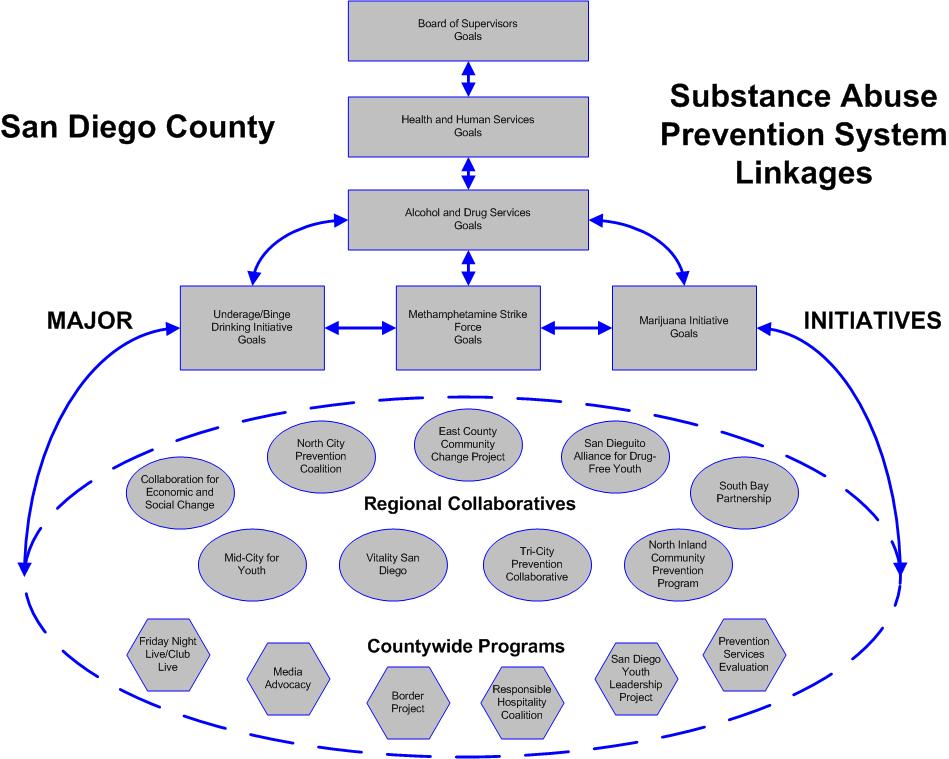County of San Diego Substance Abuse Prevention Framework (1997) Introduction This framework for the prevention of alcohol, tobacco and other drug problems has been developed so that San Diego County can achieve the greatest efficiency with public dollars and develop a more responsive approach to alcohol, tobacco and drug problem reduction in communities. The prevention framework incorporates the concept of community partnerships, the application of new, science-based knowledge of alcohol, tobacco and other drug problem reduction, and the development of a system-wide, outcome-driven prevention strategy to address the increasing trend of alcohol, tobacco and other drug use among adolescents in San Diego County. A Timely Response The emerging view on how public agencies should respond to social problems is radically changing. Traditionally, government is viewed as the body responsible for developing specific services, describing how they should be operated, and defining the specific recipients of the service. Government and other public agencies have acted as caretakers for communities. Recently, approaches to planning services have developed that change the way public agencies interact with communities. The new approach is to interact with community groups as open and equal partners in seeking the public good. The reorganization of the Department of Health Services into an integrated health services system is a clear example of government finding a better way to serve its citizens. Within the Department of Health Services, Alcohol and Drug Services (ADS) is applying a new understanding of alcohol, tobacco and other drug problems to the principles of community partnerships.  | Substance Abuse Prevention System Partnerships and Linkages | Research has demonstrated the direct relationship between the incidence of alcohol problems and the level of alcohol consumption across a specific population (1). The level of tobacco and other drug use and drug-related problems likely has the same relationship. Since alcohol, tobacco and other drug problems occur within the context of larger social and personal problems, public and private policies regarding availability and other environmental factors become key issues in preventing problems. This new understanding has sharpened the abilities of prevention specialists to develop new strategies to help make healthier communities. Finally, the nationwide general trend of declining alcohol, tobacco and other drug use is not occurring among young people, especially adolescents. Intervention on this trend is the intent of this framework.
A Proactive Partnership Public agencies are now demonstrating a greater responsiveness to actual community needs, acknowledging the ability of communities to understand their needs and to more appropriately address their own issues. Further, public agencies now seek to form partnerships with neighborhood residents, families, community organizations, educational institutions, and businesses to develop healthier neighborhoods and provide safer environments for children. This is a recognition that alcohol, tobacco and drug problems cut across individual, family and organizational boundaries, and only by bringing them together can we arrive at effective solutions. These multiple-level partnerships, which include family, community and governmental systems, can offer comprehensive and integrated responses to our common problems. A Prudent Use of Public Funds The use of public funds to help communities address alcohol, tobacco and other drug problems has had widespread support for many years in San Diego County. However, in spite of this, there are insufficient public dollars to meet the demand for alcohol, tobacco and other drug prevention services. Further, prevention funding must be paired with other community initiatives to make a significant impact in reducing problems caused or aggravated by alcohol, tobacco and other drugs. An appropriate role of government is to allocate funds that would be both equitable among communities and provide services that demonstrate efficiency and effectiveness. Public agencies will work together with communities to identify the most responsible use of public and private fiscal resources. An Integrated Approach The most significant element of the new prevention framework approach is the opportunity for neighborhoods and communities to plan, develop and implement alcohol, tobacco and other drug prevention services that are coordinated with their broader efforts to address the needs of youth and families. This new prevention framework focuses on services that offer communities the best chance to protect young people. Specific long-term goals have been established to achieve a significant reduction in the use of alcohol, tobacco and marijuana among adolescents.
The prevention framework attempts to demonstrate accountability and greater local control in planning services most significant to families within communities. Leveraging County ADS funds with other private and local funding can create a synergistic effect to build a community fiscal infrastructure. This infrastructure will provide a flexible funding base to coordinate the delivery of prevention services according to community need. Consequently, community-planned prevention efforts using a combination of public and private funding will offer more efficient and effective responses to the alcohol, tobacco and other drug problems that not only impact the daily lives of youth and families but all members of the community. Download full framework... |